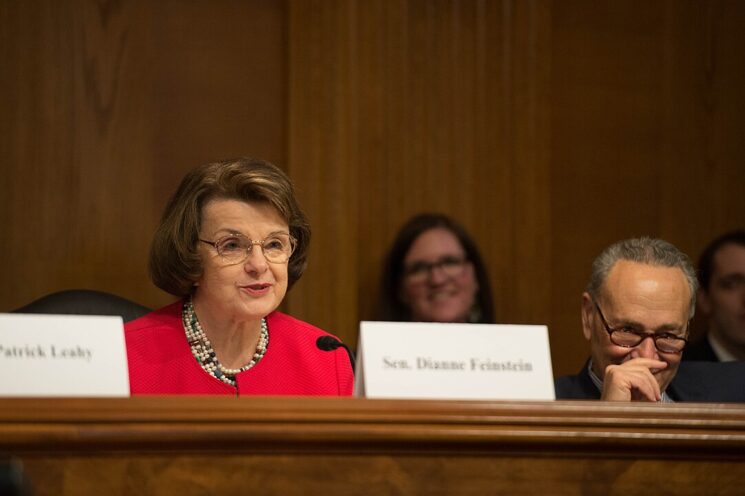
By Brandon Nguyen
California U.S. Senator Diane Feinstein’s retirement has been a topic of debate over the past few weeks. Feinstein has been in office since 1992 and is now 88 years old. After it was made public that Feinstein was admitted to the hospital with shingles, the discussion around her retirement has heated up recently. Feinstein was brought to a hospital in Washington, D.C., after showing signs of the painful disease, according to her office. However, she has recovered and is working in the Senate on a lightened schedule.
At the center of this debate is her ability to serve in the U.S. Senate and the impact her hospitalization has on the federal judiciary. Because Democrats have a majority in the U.S. in the Senate, they have a majority on the powerful Judiciary Committee, which is currently made up of 11 Democrats and 10 Republicans. However, with Feinstein’s absence, the committee is locked on a 10-10 vote on whether to forward President Biden’s judicial nominations. Without a majority, these judicial nominations cannot move to be voted on by the entire Senate and some Democrats are worried that they may not have enough time to fill judicial vacancies before the 2024 election.
This controversy has spurred the discussion of the age of U.S. Senators and whether Feinstein should resign due to her health problems.
The progressive and centrist wings of the Democratic party have debated over Feinstein’s retirement. Some progressives have been more critical of Feinstein’s record and have argued the issue of judicial nominees is too important for Feinstein to resign.
“We need to put the country ahead of personal loyalty. While she has had a lifetime of public service, it is obvious she can no longer fulfill her duties,” Representative Ro Khanna said in a statement on Twitter. “Not speaking out undermines our credibility as elected representatives of the people.”
Supporters of Feinstein have argued that calls from progressives for Feinstein to resign are based on sexism and ageism. “She deserves the respect to get well and be back on duty,” Pelosi said. “I’ve never seen them go after a man who was sick in the Senate in that way.”
With the 2024 elections looming, some progressives are increasingly worried about Republicans potentially gaining a majority in the Senate and said calls for Feinstein to retire have to do with the hold-up with federal judges.
“I think criticisms of that stance as ‘anti-feminist’ are a farce,” Representative Alexandria Ocasio Cortez said on BlueSky, a new social media app. “Her refusal to either retire or show up is causing great harm to the judiciary – precisely where repro rights are getting stripped. That failure means now in this precious window Dems can only pass GOP- approved nominees.”
The debate over Feinstein’s retirement is likely to continue to brew in the coming weeks and months. Currently, there are dozens of judicial nominations pending in the Senate. Feinstein has announced that she would retire in 2024, and so far, Representatives Katie Porter, Adam Schiff and Barabara Lee have announced their bid for the seat.
Diane Feinstein returns on a lighter schedule
Senator Feinstein returned to the Senate in May 10 in a wheelchair accompanied by aides. Her doctors advised that she work on a “lighter schedule.” On May 16, Feinstein indicated she had forgotten she was out of the Senate at all and said when asked about her return, “I haven’t been gone. I’ve been working. … I’ve been here. I’ve been voting.”
A notable aide to Feinstein has been Nancy Corinne Prowda, the eldest daughter of Pelosi. Aaron Bennet, spokesperson for Pelosi has said that Prowda was not exerting influence over Feinstein in any way to stay in the Senate.
The California U.S. Senate primary will take place on March 5, 2024 and the general election is on November 5, 2024.





